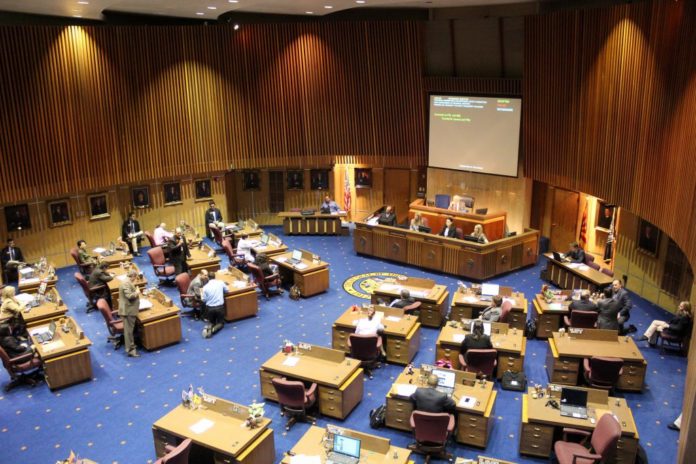The Arizona House plans to return to work this week after a two-month recess triggered by the coronavirus pandemic and despite the Senate’s decision to try to adjourn for the year.
A top priority is enacting a measure that would shield businesses that reopen from lawsuits, protecting them from being financially responsible if workers or members of the public are infected, unless they are grossly negligent. Majority Republicans who control the Legislature and GOP Gov. Doug Ducey have sought such protections, saying they’re needed to prevent frivolous litigation that could damage businesses.
But a draft of the bill circulated by backers also removes criminal penalties for businesses that ignore emergency virus orders Ducey has issued. And it bars the state from suspending or revoking business licenses for violations.
It’s unclear if the governor would agree to such provisions. “We don’t comment on draft legislation,” Ducey spokesman Patrick Ptak said Sunday.
Violations of the orders, most of which have been allowed to expire, are a misdemeanor and carry a potential six-month jail term and a $5,000 fine. Bars are the only major businesses still under shut-down orders.
“I think the penalties that are in the emergency declarations are just a little harsh,” Republican Sen. David Livingston said Saturday. “It still leaves a (civil) penalty in there, it just takes it down to $100.
Livingston was among a handful of Republican senators who opposed ending the session.
House lawmakers plan to introduce a bill that would authorize spending $88 million in emergency federal coronavirus cash for child care providers.
But Republicans who control the House also expect to start moving a host of Senate legislation that has been stalled since the Legislature recessed after passing an emergency budget on March 23. Senators returned on May 8 for a brief session where they voted overwhelmingly to end the session, but the House must agree.
Passing additional legislation will test the Senate’s resolve to adjourn.
The Rules Committee meets Monday, and floor sessions could start Tuesday or Wednesday,
House Majority Leader Warren Petersen said Saturday that the plan is to take up more than 60 Senate bills in the coming days. That includes holding committee hearings, floor debate and votes.
“Most people at least want to get work done — I think there’s even some of the Democrats that think it’s important to get the liability bill done,” Petersen said. “The stay-at-home order was lifted on the 15th, and we want to be safe and use best practices, but we want to finish the people’s work as best we can.
“But we’ll see — you never know what’s going to happen,” he said.
Democrats are mainly united in wanting to end the session, and — with 29 members — they only need two Republicans to vote for adjournment to upend the plan to resume regular work.
Some Republicans, including Rep. Anthony Kern, prefer to join the Senate in ending the session now.
Kern, who chairs the powerful Rules Committee and can stop all legislation from making it to the floor, said other than the liability proposal and potentially a couple other virus related bills he believes the House should close up shop for the year.
“Other than that, I don’t see a reason to stay in session,” he said.
But Kern wouldn’t commit to voting to adjourn.
Senate President Karen Fann said she would wait to see what the House actually does before taking any action.
“I can’t have people sitting around for three or four days, or three or four weeks,” she said.
Republican House Speaker Rusty Bowers isn’t sure what will transpire, although he advised against holding committee hearings that some chairs insist should resume. And he said plans to send legislation to the Senate when Fann’s chamber has voted to adjourn may not end well.
“I have no shortage of people that dream big and have great plans, and I will see how many work,” Bowers said. “The point is to send over some bills; if they pass them great, if not we’ll know what the pitch of the roof is. And I hope that will temper some of the zeal of some of my members.”
Republished with the permission of the Associated Press.













